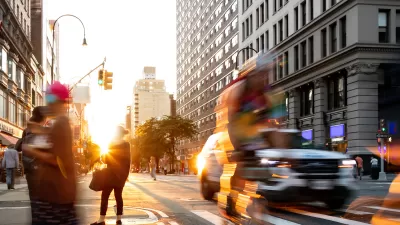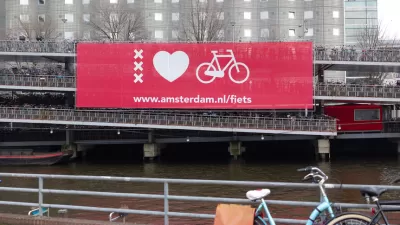In cities across America, cycling is fast becoming "just another way to get around," causing friction with its outsider reputation. Sarah Goodyear argues that for cycling to become safer for everyone, riders need to renounce their special status.
"Riding a bike in the United States has long been perceived as a statement," Goodyear says. "Being a bicyclist has been an identity, burdened with its own identity politics. The cyclist as renegade, outsider, maverick, or outlaw – that has been the image, or self-image, depending on where you stand on the 'issue' of cycling."
"But in the last couple of years, we have been moving at an almost imperceptible pace toward a different kind of reality – one in which American cities, from Chicago to Miami to Los Angeles to Boston and back around again — have been building bike infrastructure, implementing bike-share systems, passing laws protecting bicyclists, and the like."
"And biking is slowly, slowly becoming just another way to get around," she observes.
"There is a price to be paid for trying to move beyond the life-threatening rodeo days of cycling in major American cities," argues Goodyear. "It’s called civic responsibility. Playing by the rules. Making nice. Whatever you want to call it, it may mean that you’re going to have to give up your identity as a special person who does some special activity known as cycling."
UPDATE: Goodyear's piece has elicited quite the reaction, even among her own colleagues. For a counterargument on the greater enforcement of cycling laws, see Henry Grabar's response: "Why should people riding 20-pound bicycles obey laws designed to regulate the conduct of 4,000-pound cars, to say nothing of accepting the same penalties?"
"On balance, cyclists' illegal behavior—like that of pedestrians—adds much, much more convenience to life than danger," he argues. "Aggressive enforcement of traffic laws could upend the fragile system of incentives that leads thousands of people to undertake a long and sweaty commute each day."
Also see David C.'s rejoinder in Greater Greater Washington.
FULL STORY: Cyclists Aren't 'Special,' and They Shouldn't Play by Their Own Rules

Alabama: Trump Terminates Settlements for Black Communities Harmed By Raw Sewage
Trump deemed the landmark civil rights agreement “illegal DEI and environmental justice policy.”

Planetizen Federal Action Tracker
A weekly monitor of how Trump’s orders and actions are impacting planners and planning in America.

The 120 Year Old Tiny Home Villages That Sheltered San Francisco’s Earthquake Refugees
More than a century ago, San Francisco mobilized to house thousands of residents displaced by the 1906 earthquake. Could their strategy offer a model for the present?

In Both Crashes and Crime, Public Transportation is Far Safer than Driving
Contrary to popular assumptions, public transportation has far lower crash and crime rates than automobile travel. For safer communities, improve and encourage transit travel.

Report: Zoning Reforms Should Complement Nashville’s Ambitious Transit Plan
Without reform, restrictive zoning codes will limit the impact of the city’s planned transit expansion and could exclude some of the residents who depend on transit the most.

Judge Orders Release of Frozen IRA, IIJA Funding
The decision is a victory for environmental groups who charged that freezing funds for critical infrastructure and disaster response programs caused “real and irreparable harm” to communities.
Urban Design for Planners 1: Software Tools
This six-course series explores essential urban design concepts using open source software and equips planners with the tools they need to participate fully in the urban design process.
Planning for Universal Design
Learn the tools for implementing Universal Design in planning regulations.
Clanton & Associates, Inc.
Jessamine County Fiscal Court
Institute for Housing and Urban Development Studies (IHS)
City of Grandview
Harvard GSD Executive Education
Toledo-Lucas County Plan Commissions
Salt Lake City
NYU Wagner Graduate School of Public Service




























